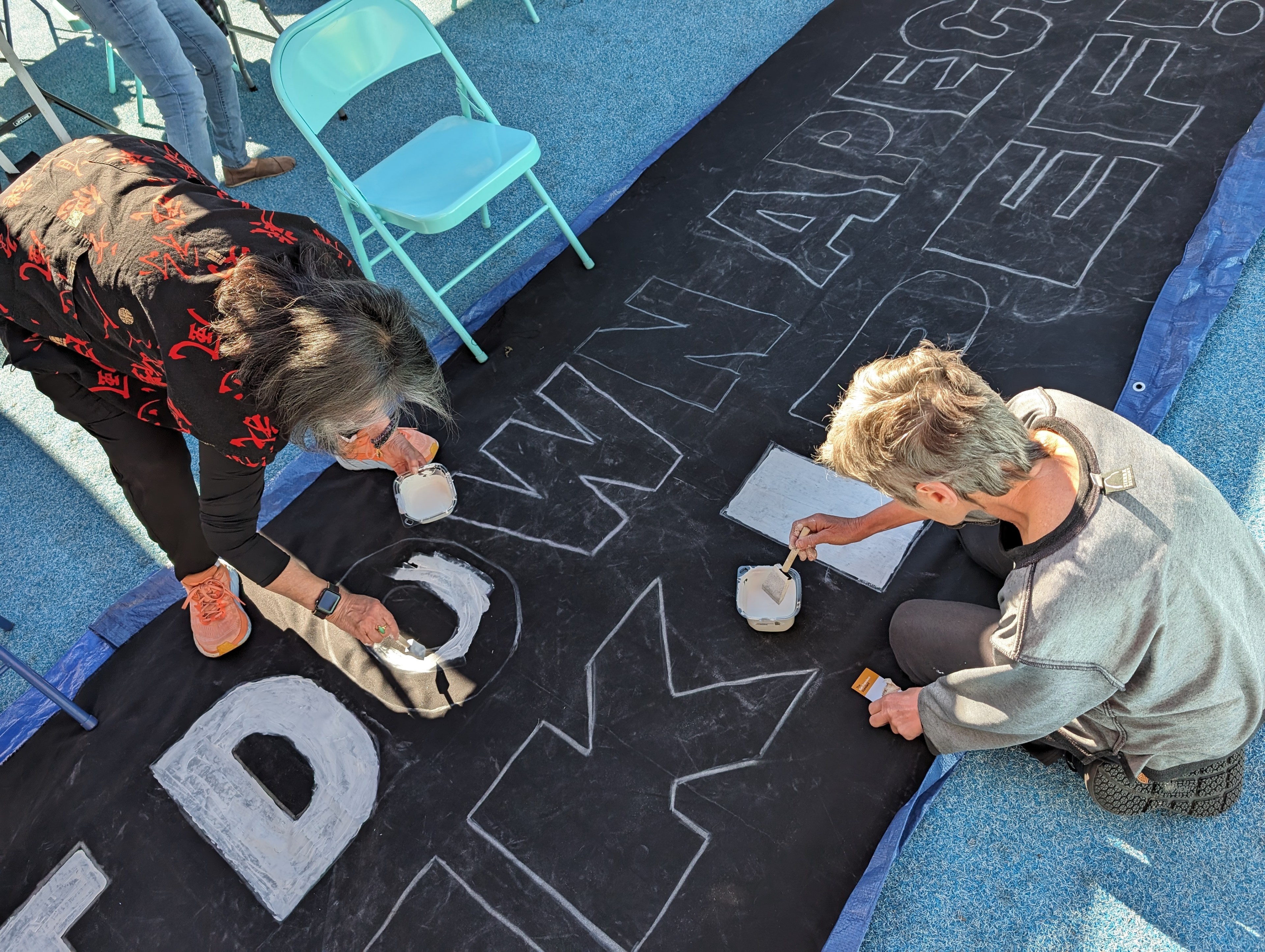Atop a blue plastic tarp stretched across artificial grass at San Francisco’s Kapwa Gardens on Sunday, Pam Tau Lee and Kathe Burick were putting words into action at a community teach-in about the upcoming Asia-Pacific Economic Cooperation summit, set to take place in the city next month.
Lee and Burick painted bright white letters onto a large black banner that read “SHUT DOWN APEC!” and “JUNK IPEF!” referring to the Indo-Pacific Economic Framework, the Biden administration’s road map for a new Asia-Pacific economic strategy.
APEC, launched more than 30 years ago, is a grouping of 21 member economies, including the U.S., China, Japan, South Korea and Australia, aimed at promoting free trade throughout the Asia Pacific region. It hosts multiple meetings in a given host nation throughout the year. The main meeting this year will take place Nov. 14-17 at Moscone Center in the South of Market neighborhood, not far from Kapwa Gardens.
Lee, 75, said she first heard about APEC about four months ago, but added that her experience meeting Mexican maquiladora workers and visiting their homes informed her own stance against what she described as dangerous free-trade agreements.
“My understanding is that they can’t make formal agreements, but they can make strong recommendations that have influence and enable more powerful people to carry out what they want to have happen,” Lee said. “That has a huge impact on people’s lives, rights, voice and presence.”
‘Human Need … Over Corporate Greed’
For Lee, the other important issue was the APEC-related security restrictions on physical space and movement for caregivers and food delivery services, as well as seniors long used to walking or taking transit to visit friends or sit in parks.
Details of the security for the event were announced two weeks ago by the U.S. Secret Service and will include a locked-down, four-square-block section of Downtown around the Moscone Center, closed streets and shut-down transit lines—including the Central Subway—as well as limited air traffic over San Francisco.
Nob Hill will also be a restricted zone, and part of the Embarcadero will be closed Nov. 15.
“I believe that human need should be prioritized over corporate greed, and that’s what APEC represents to me,” said Burick.
Nearby, as organizer Narissa Lee stood near a vendor selling butter mochi, vegan chocolate cupcakes and iced oat-milk lattes, she laid out what she saw as the stakes for the upcoming conference.
“It’s a great way for us to really educate ourselves and each other on the impacts of these types of economic free trade agreements that occur with different regions of the world,” Lee said. She noted that “this is the most heads of state we’ve ever hosted, I think, even more so than the signing of the U.N. charter in the ’40s. And so this is a really big deal.”
A ‘No to APEC’ Collective?
Lee said her group, San Francisco Committee for Human Rights in the Philippines, was partnering with other community groups and activists, including labor unions, women’s organizations, immigration and climate activists, youth groups and students for a “No to APEC” collective. The group plans to call out concerns about the security measures’ financial impact on local businesses and the right of residents to assemble and protest.
“They’re doing this behind closed doors,” Lee said. “They’re not including people who are the most impacted. They’re not including workers, but they’re talking about diminishing workers’ rights and rolling them back to standards from the 1990s.”
At a quiet table in the garden, David Delena sat with his son Caeden, 3, whose eyes lit up with flashes of delight over a game he was playing on a tablet. Delena told The Standard that he had learned this week that the day care center his son attends near Fourth and Folsom streets will close for three days during APEC. He said he’s yet to hear about how Bessie Carmichael Elementary School on Seventh Street, where his wife works, will be affected.
“It ain’t going to work out, just to get to his school,” Delena said. “There’s checkpoints, and I hear it’s like airport screening. For me driving, I don’t know what parking looks like. There’s always conferences that go on here for Salesforce, and it’s already packed for parking and dropping kids off. This would be even more challenging.”
Delena said he felt many community members were unprepared for the changes coming to the neighborhood during APEC, and he was worried about businesses being forced to close. “I don’t feel like many residents are in support of APEC,” said Delena. “There are probably a few who will benefit, but I don’t know if it’s the average working family that will benefit or it will be a hindrance.”
As for the city’s perspective on the world stage, Delena didn’t expect much unity.
“I’m just going to guess it’s going to look different than how we feel locally,” he said. “You know, they’ll probably project, ‘Oh yeah, this was great; we raised so much money,’ you know?” he said. “But some people on the ground who live here, I don’t know if we’ll have that same feeling towards it. Because it’s back to work every day after that takes place.”
